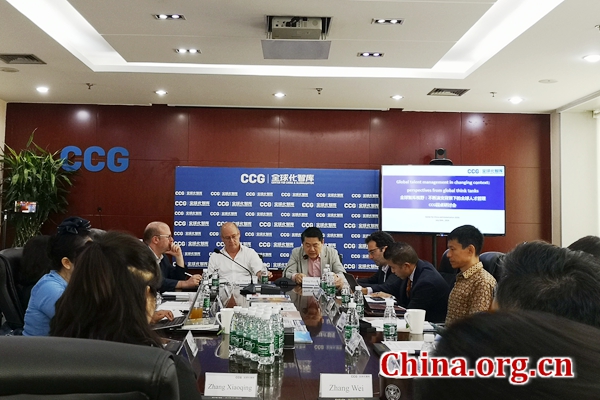Experts review global talent management modes
- By Wang Yiming
 0 Comment(s)
0 Comment(s) Print
Print E-mail China.org.cn, July 16, 2019
E-mail China.org.cn, July 16, 2019

Following the 2019 Conference on Global Migration and Talent Mobility held last Saturday, a roundtable discussion on the theme of "Global talent management in a changing context: perspectives from global think tanks" was co-hosted by the Center for China and Globalization (CCG), and Mercator Institute for China Studies (MERICS).
A group of prominent scholars, experts and officials in the field of migration from CCG, MERICS, various international organizations, foreign think tanks and universities shared insights into the theory and practice in the management of global talent in order to offer policy advice for China's own talent migration management regime.
"China is fully experiencing the era of globalization. It is now not only an outbound source but also an inbound destination for migration. There's a new framework and major paradigm shift, with new challenges to be met," said CCG President Wang Huiyao in his opening remarks.
Martin Geiger, associate professor of the politics of human migration and mobility at Carleton University of Ottawa, and a member of the International Metropolis Network, stressed that maintaining openness for global talent flows was essential for the growth of innovation.
"We have another area of globalization, global competition of talent," he said. "We now have more and more destinations for the movement of global talents. It will do much harm to innovation and your research development system if it's going to get harder to obtain visas and if there's more red tape, people are going to get worried about their treatment."
Responding to the topic of "talent types," put forward by Tomas Liebig, deputy head of the International Migration Division at the OECD, Wang Huiyao raised the growing issue of an aging population and said China needed to be more open to highly skilled, semi-skilled and high school talents coming from outside.
Neil G. Ruiz, associate director of Global Migration & Demography Research introduced the global challenges posed by the demographic changes to provide a wider context for the discussion of China's strategies and challenges. He proposed that China must think about which system to adopt - a market-driven system or a more permanent, fixed system.
Other experts raised points of discussion ranging from family migration, treatment of international studentsc to factors that could attract talents and promote more migration.






Go to Forum >>0 Comment(s)